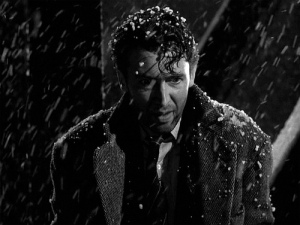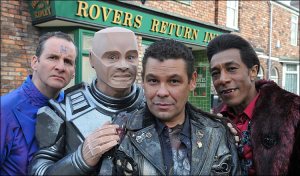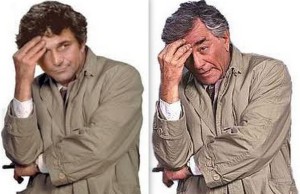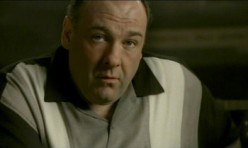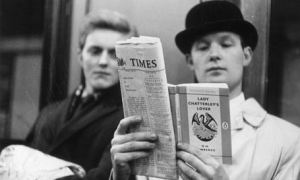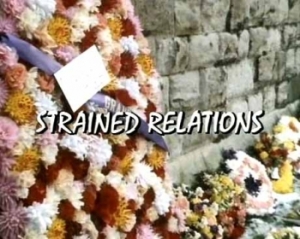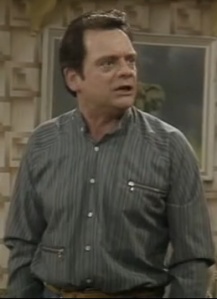Director Martin Scorsese’s ingenious use of music is one of his many trademarks, and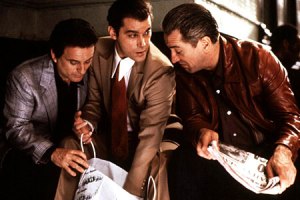 Goodfellas provided a perfect platform for him to show off his talents. Made in 1990 and based on the book Wiseguy by Nicholas Pileggi, Goodfellas traces the life of low-level gangster Henry Hill (Ray Liotta) from his teenage years in the 1950s to his betrayal of those closest to him three decades later. The time period covered opened up the perfect opportunity to soundtrack Hill’s excessive lifestyle and turbulent marriage to wife Karen with a mix of rock ‘n’ roll, rhythm and blues (the proper kind), doo-wop and more.
Goodfellas provided a perfect platform for him to show off his talents. Made in 1990 and based on the book Wiseguy by Nicholas Pileggi, Goodfellas traces the life of low-level gangster Henry Hill (Ray Liotta) from his teenage years in the 1950s to his betrayal of those closest to him three decades later. The time period covered opened up the perfect opportunity to soundtrack Hill’s excessive lifestyle and turbulent marriage to wife Karen with a mix of rock ‘n’ roll, rhythm and blues (the proper kind), doo-wop and more.
Scorsese wanted every song to be true to the time period portrayed, so all music heard in the film is from the era shown or earlier. The music isn’t just thrown into the scenes, though – Scorsese and his long-time editor Thelma Schoonmaker painstakingly ensured beat changes coincided with key cuts and lyrics fitting to the action on screen came in at the ideal moment. The result is an exhilarating, breathless journey, and I’ve chosen 10 great music moments from it, in chronological order.
1. ‘Rags to Riches’ – Tony Bennett
What a way to start a film. We’re told it’s New York, it’s 1970 and that what we’re about to see is based on a true story. We then join an exhausted Henry Hill driving cronies Jimmy Conway (Robert De Niro) and Tommy DeVito (Joe Pesci) home in the early hours. They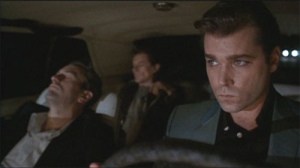 hear a thudding noise and pull over to see what’s up. As Henry prepares to open the boot, Tommy produces a knife, which we later discover was procured from his mother’s house on the way. When the boot swings open, we see a bloodied man wrapped in tablecloths pleading for his life – more of that later – whom Tommy stabs repeatedly (complete with gruesome sound effects). Jimmy fires four shots into the body before Henry steps forward and, via voiceover, says: “As far back as I can remember, I always wanted to be a gangster.” The end of the last word is followed immediately by the combined sound of the boot slamming shut and the blast of the opening trumpet notes from ‘Rags to Riches’.
hear a thudding noise and pull over to see what’s up. As Henry prepares to open the boot, Tommy produces a knife, which we later discover was procured from his mother’s house on the way. When the boot swings open, we see a bloodied man wrapped in tablecloths pleading for his life – more of that later – whom Tommy stabs repeatedly (complete with gruesome sound effects). Jimmy fires four shots into the body before Henry steps forward and, via voiceover, says: “As far back as I can remember, I always wanted to be a gangster.” The end of the last word is followed immediately by the combined sound of the boot slamming shut and the blast of the opening trumpet notes from ‘Rags to Riches’.
The timing of this moment is sheer perfection – we’re still trying to take in the horror of what we’ve just seen and Scorsese whisks us into the titles with a brilliantly bombastic piece of music. The breathless pace of the film is established, and the viewer already knows they’re in for a hell of a ride.
2. Then He Kissed Me – The Crystals
Quite simply one of the finest scenes in film history. Henry, at 21, is already immersed in the underworld and dating the beautiful Karen (Lorraine Bracco). She accompanies him to the Copacabana, where Henry’s influence becomes clear when they bypass the long queue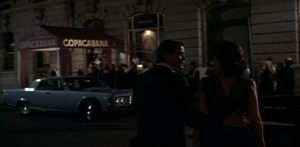 and enter through a side entrance. They make their way into the club via the kitchens – staff greeting Henry at every turn and a waiter having a table placed right at the front especially for them. To emphasise Henry’s privileged entrance, Scorsese captures it with a wonderful single Steadicam shot – an unbroken three-minute masterpiece that begins outside at Henry’s car and ends with comedian Henny Youngman on stage.
and enter through a side entrance. They make their way into the club via the kitchens – staff greeting Henry at every turn and a waiter having a table placed right at the front especially for them. To emphasise Henry’s privileged entrance, Scorsese captures it with a wonderful single Steadicam shot – an unbroken three-minute masterpiece that begins outside at Henry’s car and ends with comedian Henny Youngman on stage.
The use of ‘Then He Kissed Me’ – a classic girl-meets-boy song – in its entirety sums up Karen’s giddiness as Henry sweeps her off her feet: “When he danced he held me tight / And when he walked me home that night / All the stars were shining bright / And then he kissed me”.
3. Ain’t That a Kick in the Head? – Dean Martin
The first of three songs encompassing the film’s pivotal moment, ‘Ain’t That a Kick in the Head’ precedes the killing of ‘made man’ Billy Batts (Frank Vincent) in The Suite, a bar 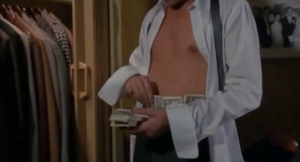 owned by Henry. Up to this point, we’ve followed Henry’s rise and rise as his mob life makes him rich and his happy relationship with Karen results in marriage. Henry’s approaching a downward slope though, and the song’s title playfully suggests not only this, but also the manner in which it will come about.
owned by Henry. Up to this point, we’ve followed Henry’s rise and rise as his mob life makes him rich and his happy relationship with Karen results in marriage. Henry’s approaching a downward slope though, and the song’s title playfully suggests not only this, but also the manner in which it will come about.
Heard over a montage of ‘happy family’ moments, this song is a great example of Scorsese’s fondness for black humour as its use also predicts Jimmy’s contribution to his and Tommy’s brutal murder of Batts.
4. He’s Sure the Boy I Love – The Crystals
After a ‘romantic’ moment between Henry and Karen, we cut to an establishing shot of The Suite, with the camera tracking slowly towards it. At the moment of the cut the ominous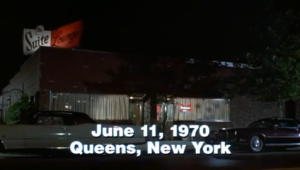 baritone saxophone opening note of ‘He’s Sure the Boy I Love’ is heard, which sets the scene perfectly for what’s to come. Inside, Henry is holding a ‘welcome home’ party for Billy Batts who has just been released from prison after six years. After Batts makes a flippant remark to the volatile Tommy, the latter explodes and before leaving urges Henry and Jimmy to “keep him here.”
baritone saxophone opening note of ‘He’s Sure the Boy I Love’ is heard, which sets the scene perfectly for what’s to come. Inside, Henry is holding a ‘welcome home’ party for Billy Batts who has just been released from prison after six years. After Batts makes a flippant remark to the volatile Tommy, the latter explodes and before leaving urges Henry and Jimmy to “keep him here.”
5. Atlantis – Donovan (warning: contains violence)
Tommy later returns to The Suite as we hear the dreamy opening narrative of Donovan’s ‘Atlantis’. A drunk Billy Batts complains about having to provide for his kids so soon after 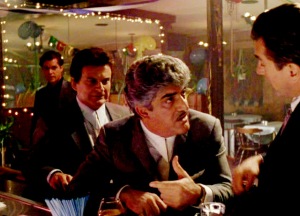 coming out of jail, with Jimmy keeping him occupied. Henry spots Tommy at the door and makes his way to guard it. Facing Batts, we can see Tommy approach him from behind, but the victim-to-be is unaware. At the moment Batts turns to see Tommy, ‘Atlantis’ kicks into its chorus with a rapid drum roll. Tommy strikes Batts to the ground and he and Jimmy savagely beat the man as a horrified Henry watches on and the chorus repeats: “Way down below the ocean / Where I wanna be / She may be”.
coming out of jail, with Jimmy keeping him occupied. Henry spots Tommy at the door and makes his way to guard it. Facing Batts, we can see Tommy approach him from behind, but the victim-to-be is unaware. At the moment Batts turns to see Tommy, ‘Atlantis’ kicks into its chorus with a rapid drum roll. Tommy strikes Batts to the ground and he and Jimmy savagely beat the man as a horrified Henry watches on and the chorus repeats: “Way down below the ocean / Where I wanna be / She may be”.
Scorsese could not have chosen a more peaceful and unthreatening a piece of folk-pop and it’s for exactly this reason it’s such a wonderful choice of song. The juxtaposition of the horrific violence and the beautiful music means we’re both uplifted and disgusted at the same time. As well as brilliantly manipulating our emotions, it’s also another great bit of black humour from the director.
6. Gimme Shelter – The Rolling Stones
A Scorsese favourite, the incredible ‘Gimme Shelter’ was also used in Casino and The Departed, the latter featuring the ominous opening section of the song to get the film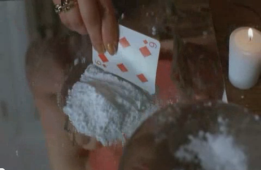 started. In Goodfellas it’s used as we see Henry promising boss Paulie (Paul Sorvino) he won’t get involved with drugs, before a cut to a shot of a huge amount of cocaine being mixed with playing cards. The line “Rape, murder, it’s just a shot away” bridges the cut so that the cocaine scene begins with “Murder, it’s just a shot away” – a suggestion of what’s to come. The line “A storm is threatening my very life today” is equally prophetic.
started. In Goodfellas it’s used as we see Henry promising boss Paulie (Paul Sorvino) he won’t get involved with drugs, before a cut to a shot of a huge amount of cocaine being mixed with playing cards. The line “Rape, murder, it’s just a shot away” bridges the cut so that the cocaine scene begins with “Murder, it’s just a shot away” – a suggestion of what’s to come. The line “A storm is threatening my very life today” is equally prophetic.
7. Monkey Man – The Rolling Stones
Another classic Stones song, ‘Monkey Man’ is heard twice, Scorsese using different sections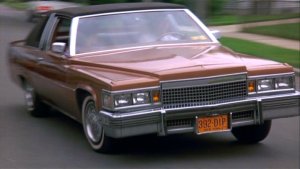 in two separate scenes. Firstly, as we see Henry bringing in cocaine via his ‘Pittsburgh connections’, the song’s opening lines are heard: “I’m a flea-bit peanut monkey / All my friends are junkies”. Later, as a paranoid, drug-addled Henry and Karen tear around a corner in their car the song re-appears, Mick Jagger’s screeching of: “I’m a monkey” and the riotous guitar riff echoing the couple’s chaotic existence perfectly.
in two separate scenes. Firstly, as we see Henry bringing in cocaine via his ‘Pittsburgh connections’, the song’s opening lines are heard: “I’m a flea-bit peanut monkey / All my friends are junkies”. Later, as a paranoid, drug-addled Henry and Karen tear around a corner in their car the song re-appears, Mick Jagger’s screeching of: “I’m a monkey” and the riotous guitar riff echoing the couple’s chaotic existence perfectly.
8. Frosty the Snowman – The Ronettes
It’s Christmas time and Henry and his cronies have just pulled off the ‘Lufthansa heist’, a $5 million robbery of John F Kennedy Airport. Jimmy’s has advised everyone to maintain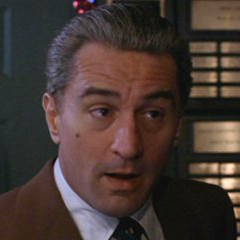 a low profile as the police keep them all under scrutiny. This includes not buying anything flashy that might attract attention. So what happens? At a party shortly afterwards, Johnny Roastbeef (Johnny Williams) arrives with his fiancee and a brand new Cadillac. Suffice to say, Jimmy is not happy. This is before Frankie Carbone (Frank Sivero) turns up with his wife wrapped in a mink coat, sending Jimmy over the edge.
a low profile as the police keep them all under scrutiny. This includes not buying anything flashy that might attract attention. So what happens? At a party shortly afterwards, Johnny Roastbeef (Johnny Williams) arrives with his fiancee and a brand new Cadillac. Suffice to say, Jimmy is not happy. This is before Frankie Carbone (Frank Sivero) turns up with his wife wrapped in a mink coat, sending Jimmy over the edge.
A scene of high tension – and De Niro raging as only he can – is soundtracked perversely (and hilariously) by The Ronettes’ ‘Frosty the Snowman’. As Johnny walks in we hear the opening line: “Frosty the Snowman was a jolly happy soul”, a darkly ironic precursor of Jimmy’s soon-to-be sour mood.
9. Layla – Derek and The Dominos
His associates buying expensive and attention-drawing items isn’t Jimmy’s only problem. Morrie (Chuck Low) is pestering Jimmy for his share of the loot and ‘Stacks’ Edwards (Samuel L Jackson) was supposed to get rid of the truck used in the robbery but instead got stoned and fell asleep, leaving the police to find the vehicle with his prints all over it. This leaves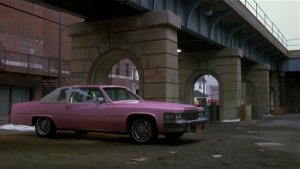 Jimmy paranoid and eager to cut his connections to the robbery. After we see Morrie and Stacks killed, a scene begins with a shot of Johnny Roastbeef’s Cadillac parked under a railway bridge. Some inquisitive kids approach the car and the moment we cut back to it, the instrumental section of Derek and The Dominos’ ‘Layla’ kicks in. This sweeping, melancholy piece is the background for a montage revealing Johnny and his fiancee dead in the car, bodies discovered in a garbage truck and Frankie frozen stiff among slabs of meat in a lorry.
Jimmy paranoid and eager to cut his connections to the robbery. After we see Morrie and Stacks killed, a scene begins with a shot of Johnny Roastbeef’s Cadillac parked under a railway bridge. Some inquisitive kids approach the car and the moment we cut back to it, the instrumental section of Derek and The Dominos’ ‘Layla’ kicks in. This sweeping, melancholy piece is the background for a montage revealing Johnny and his fiancee dead in the car, bodies discovered in a garbage truck and Frankie frozen stiff among slabs of meat in a lorry.
The music isn’t edited down to fit the scene, it’s a meticulously-planned four minutes that again divides our emotions – grim discoveries of corpses versus a beautiful song. Scorsese had the song playing in the background during filming of the scene so that certain key changes could match cuts and moments on screen. The viewer only receives this subconsciously, but it’s what helps make this sequence one of Goodfellas‘ most memorable.
10. What is Life – George Harrison
This song is one of several heard during the frantic sequence in which we see a drug-addled Henry trying to sell gun silencers, doing cocaine and convincing himself he’s being trailed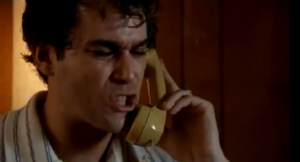 by a helicopter, all whilst he runs errands and helps prepare dinner at home. The uplifting, catchy and intoxicating music enhances an already exhilarating scene.
by a helicopter, all whilst he runs errands and helps prepare dinner at home. The uplifting, catchy and intoxicating music enhances an already exhilarating scene.
This is why Scorsese’s music choices – along with Schoonmaker’s masterful editing – are so crucial to the frantic pacing of Goodfellas. The 145 minutes fly by at a blistering pace, mirroring the rise and fall of Henry’s mob life.
 fter Nintendo last week announced the release of the SNES Mini Classic (I have neither the time nor the inclination to get into a tedious explanation/analysis of the various titles this system goes by), the diminutive console has received plenty of attention – not all of it positive.
fter Nintendo last week announced the release of the SNES Mini Classic (I have neither the time nor the inclination to get into a tedious explanation/analysis of the various titles this system goes by), the diminutive console has received plenty of attention – not all of it positive.
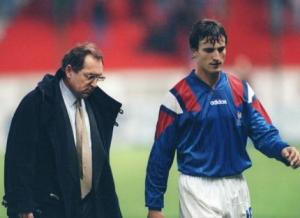
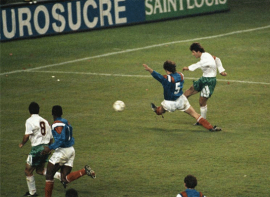











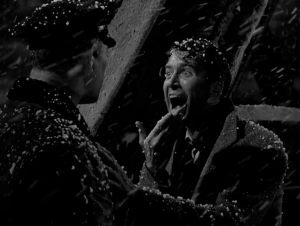 ought to be an essential part of anyone’s Christmas. The film premiered in New York in December 1946 and sees George Bailey (James Stewart) contemplating suicide before being shown by an angel named Clarence Odbody (Henry Travers) what the world would be like if he’d never been born.
ought to be an essential part of anyone’s Christmas. The film premiered in New York in December 1946 and sees George Bailey (James Stewart) contemplating suicide before being shown by an angel named Clarence Odbody (Henry Travers) what the world would be like if he’d never been born.